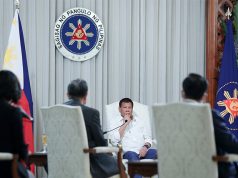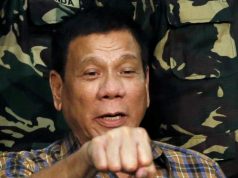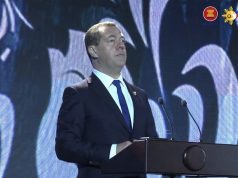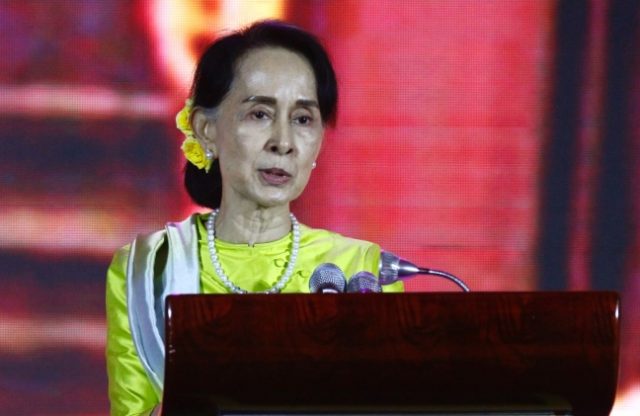
MANILA – There is a “somewhat reprehensible” Burmese saying, according to Myanmar State Counsellor Aung San Suu Kyi, that goes, “You must treat your son like a lord, and your husband like a god.”
“I don’t think I quite agree with that,” she said, delivering a speech at the ASEAN Business and Investment Summit on Sunday at the Solaire Resort and Casino in Parañaque City. “And I don’t think the women here agree, either.”
Nevertheless, it is still tradition to look upon men as superior to women in her Southeast Asian country. And throughout the region, she said, “women are still missing out on opportunities in countless areas.”
She continued: “The social norm that equates women with unskilled labor and perceives them as mere homemakers incapable of making decisions is one of our biggest challenges.”
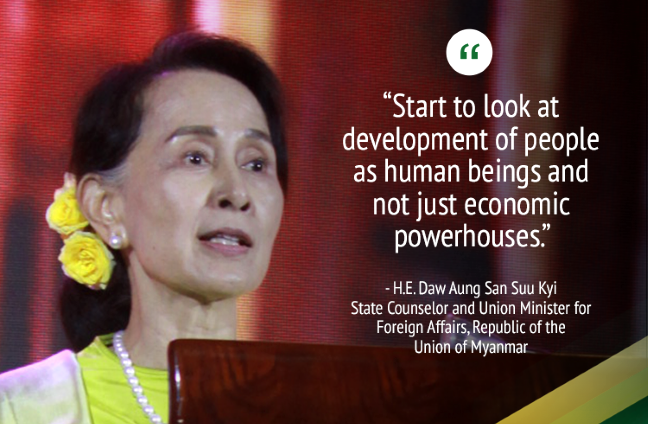
But, nowadays, more and more women are participating in Myanmar’s transformation. At least 49 percent of young Burmese entrepreneurs are women, Suu Kyi added.
“Traditionally our women have always been at the forefront of business,” she said. “We always depended on our women to make sure that our families were economically secure.”
As the majority of women-led enterprises are small- and medium-sized, they face challenges such as access to finance, markets, land, information, and technology.
They have to cope with gender discrimination as well.
“To achieve positive change in women’s rights, it is important to increase the number of girls enrolling primary and secondary school, improve the participation of women in the labor force, ensure better maternal health outcomes, provide most solid social protection measures, and promote the role of women in decision-making,” Suu Kyi stated.
She reported that Myanmar developed a 10-year national strategic plan to advance women, and that the country is committed to creating an enabling environment for women so they can realize their potential.
She invited the rest of the Association of Southeast Asian Nations to do the same.
“Developing countries must strive to develop human capital. This can be done through education and training to produce a qualified workforce that can compete in the changing economic global environment,” the Burmese leader said.
They must also think about whether they are developing people to become better human beings rather than simply more empowered in material terms.
“Because Myanmar, as a young democracy struggling with many, many challenges, has become fully aware of the need for development of peoples as human beings, not just as economic powerhouses,” Suu Kyi said. “And our women, too, need to be empowered to become better human beings as well as better economic players.”
But the Nobel Peace Prize winner was mum on the Burmese government’s plans for the Rohingya ethnic refugees, 600,000 of whom have fled the country since August, when the army cracked down on insurgents in what the United Nations has described as ethnic cleansing.
She, instead, discussed the country’s progress in terms of “integrity, plus business”.
“We depend for our economic development the enhancement of integrity. I think that’s a better way of … putting it than saying getting rid of corruption,” Suu Kyi said.
She noted that some of those who previously did business in Myanmar have said it was easier to do so then because they only had to know whom to bribe. Now, they have to know how to do business “the right way”.
“For Myanmar, newly emerged from decades of economic and political isolation, and amid the recent global economic slowdown, there are many challenges. Yet, despite these, we remain committed to stay the course to achieve inclusive and sustainable development together with all ASEAN countries,” Suu Kyi said. “As a responsible member of ASEAN, Myanmar will work together with all our ASEAN family members to become more connected and integrated economically and socially.”




